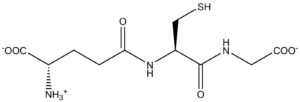We hear about antioxidants in any mention of skincare, but why?
Oxidation and antioxidants
Before talking antioxidants, first we need to talk about damage. Oxidative damage, that is. It’s a bit like rust in a machine, but in your cells. Oxidative damage occurs when the body’s cells become stressed, for example by heat or UV light.
A particular stress to the skin happens when it is exposed to sunlight, and particularly its high-energy ultraviolet spectrum light. With sun exposure, many chemical changes take place within the skin’s cells, proteins and DNA. Photo-oxidation is a kind of oxidative damage caused when sunlight induces the production of free radicals. Most people have heard of free radicals—and they’ve probably seen and felt their effects, too. It is these reactive, damaging chemicals that lead to sunburn, suntan and wrinkles.
Antioxidants eat up or “scavenge” free radicals, often chemically changing and being inactivated in the process, but as they are consumed they remove the free radical and prevent oxidative damage.
Oxidative damage and your skin
As your skin is on the outside of you, some part of your skin will experience oxidative damage every time you go outside.
Photo-oxidation in skin cells will:
- Trigger melanin deposition and the formation of a suntan (the body’s natural defence against UV light). If your skin develops a tan, damage has occurred. Hyper-pigmented spots (e.g., freckles, melasma) are other consequences of photo-oxidation in skin cells.
- Cause DNA damage and genetic mutations.
- Makes skin age and wrinkle faster by degrading the skin’s collagen, leading to wrinkles and a lack of elasticity.
- (With over-exposure) cause a sunburn.
- (In excess and over time) lead to skin cancers (e.g., melanoma).
To make this worse, some areas of skin are only rarely protected by clothing—like the face, neck and hands—and it is these areas that benefit most from the application of sunscreens and antioxidants.
So, clearly I need antioxidants for my skin!
Since antioxidants are “scavengers” of free radicals, when they are applied to the skin they can prevent and treat oxidative damage. The safest antioxidants are those found in our own cells and in foods, such as:
Vitamin C (ascorbic acid)

L-Ascorbic acid
- In the body, Vitamin C is a cofactor in at least eight enzymatic reactions—including collagen synthesis—that are especially important in wound-healing.
- A very potent antioxidant.
- Reduces damage & hyperpigmentation from sun exposure.
- Reduces the appearance of age-related changes, such as skin wrinkles and age spots.
- Has been used for the treatment of scarring and hyperpigmentation (e.g., freckles, melasma, or “age” or “liver” spots).
Vitamin E (α-tocopherol)

α-tocopheryl acetate
- A variant, α-tocopheryl acetate, is used in skin care because it is more stable than the plain vitamin and is able to penetrate through the skin to the living cells (where it is converted to free α–tocopherol to provide beneficial antioxidant effects).
- Strong antioxidant that protects skin cell membranes from damage.
- May assist with wound healing and reduce scarring.
- May possess natural sunscreen characteristics.
Coenzyme Q10 (ubiquinone)

Ubiquinone
- Kind of like a vitamin, but technically it is called a “cofactor”. It is necessary for virtually all cellular energy metabolism.
- A very potent antioxidant, as it can absorb two free radicals per molecule!
- Heals and repairs skin, by increasing collagen production.
- May protect against damage from sun exposure.
- Reduces the appearance of age-related skin changes, such as skin wrinkles and age spots.
Glutathione

Glutathione
- Glutathione is not really a vitamin, either—rather, it’s a peptide or tiny protein—but it is one of the major antioxidant chemicals in the human body. It’s the body’s first line of defence against free radicals.
- It is a strong antioxidant that works by binding to free radicals.
- Lightens skin by preventing melanin formation.
- Smooths skin and increases its moisture content, and so improves the appearance of age-related skin changes (like wrinkles and spots).
Silibinin (from milk thistle seed extract)

Silibinin
- Silibinin is an exciting new neutraceutical ingredient that has powerful antioxidant effects.
- May reduce skin hyperpigmentations and melasma.
- Sunscreen plus! Silibinin may prevent UV damage from ever occurring to skin, preventing skin thickening and DNA damage.
- May protect against UV-induced skin cancers.
- Safe, natural, and side-effect free.
Put antioxidants on your skin
You can include one or all of the above antioxidants (as well as sunscreens, the skin cancer-fighting vitamin B3, and many other options) in a BCP Custom Skincare product, such as a moisturiser. Get your BCP Custom Moisturiser today!
Vitamins C and E are also available in our ever-popular BCP Vitamin C Serum, which is available to purchase online in our BCP Shop.
If you would like help selecting which vitamins and oils to put into your skincare you can book a FREE UV skin analysis (Albury only) with our skin consultant Melanie. or contact us to discuss your skin type and skin concerns.
BCP products are unique, because they are formulated by pharmacists.
